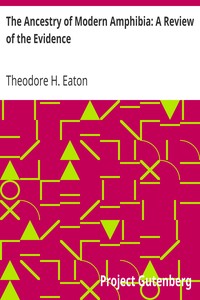The Ancestry of Modern Amphibia: A Review of the Evidence by Theodore H. Eaton
"The Ancestry of Modern Amphibia: A Review of the Evidence" by Theodore H. Eaton, Jr. is a scientific publication written in the mid-20th century. This book provides an in-depth examination of the evolutionary relationships and origins of modern amphibians, focusing on their ancestral ties to ancient species. Through careful analysis of paleontological evidence, Eaton aims to elucidate the lineage of modern amphibians such as frogs, salamanders, and caecilians. In this thorough review,
Eaton discusses various groups of ancient amphibians and their structural features, comparing them to the characteristics of contemporary amphibians. He highlights critical similarities and differences among modern orders, particularly Anura (frogs) and Urodela (salamanders), to propose their potential common ancestry stemming from Paleozoic labyrinthodonts. Eaton provides a detailed account of skeletal structures, ear mechanisms, and developmental processes across numerous species, arguing that the evolutionary history of these creatures is marked by significant adaptations to both aquatic and terrestrial environments. Throughout the work, the author integrates morphological data and embryological insights, building a case for a closely linked evolutionary heritage among modern amphibians. (This is an automatically generated summary.)
Read or download for free
| How to read | Url | Size | |||
|---|---|---|---|---|---|
| Read now! | https://www.gutenberg.org/ebooks/37350.html.images | 84 kB | |||
| EPUB3 (E-readers incl. Send-to-Kindle) | https://www.gutenberg.org/ebooks/37350.epub3.images | 1.0 MB | |||
| EPUB (older E-readers) | https://www.gutenberg.org/ebooks/37350.epub.images | 1.0 MB | |||
| EPUB (no images, older E-readers) | https://www.gutenberg.org/ebooks/37350.epub.noimages | 88 kB | |||
| Kindle | https://www.gutenberg.org/ebooks/37350.kf8.images | 1.1 MB | |||
| older Kindles | https://www.gutenberg.org/ebooks/37350.kindle.images | 1.1 MB | |||
| Plain Text UTF-8 | https://www.gutenberg.org/ebooks/37350.txt.utf-8 | 70 kB | |||
| Download HTML (zip) | https://www.gutenberg.org/cache/epub/37350/pg37350-h.zip | 1011 kB | |||
| There may be more files related to this item. | |||||
Similar Books
About this eBook
| Author | Eaton, Theodore H. (Theodore Hildreth), 1907-1981 |
|---|---|
| Title | The Ancestry of Modern Amphibia: A Review of the Evidence |
| Note | Reading ease score: 49.2 (College-level). Difficult to read. |
| Credits |
Produced by Chris Curnow, Charlene Taylor, Joseph Cooper and the Online Distributed Proofreading Team at http://www.pgdp.net |
| Language | English |
| LoC Class | QH: Science: Natural history |
| Subject | Amphibians, Fossil |
| Subject | Amphibians -- Anatomy |
| Category | Text |
| EBook-No. | 37350 |
| Release Date | Sep 8, 2011 |
| Copyright Status | Public domain in the USA. |
| Downloads | 216 downloads in the last 30 days. |
| Project Gutenberg eBooks are always free! | |


